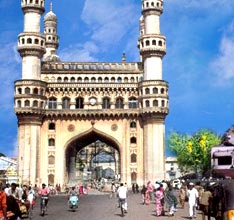 Referred
in the great Sanskrit epics, Andhra Pradesh traces its history and
origin back to the 5th century BC. As stated by the inscriptions,
Kuberaka had a kingdom in the coastal Andhra during that period.
Perhaps, this kingdom is known to be oldest one in South India. In the
4th century BC, the Mauryans extended their kingdom to rule over Andhra
Pradesh. The Mauryan Empire was declined when Andhra Satavahanas arrived
on the scene in the 3rd century BC.
Referred
in the great Sanskrit epics, Andhra Pradesh traces its history and
origin back to the 5th century BC. As stated by the inscriptions,
Kuberaka had a kingdom in the coastal Andhra during that period.
Perhaps, this kingdom is known to be oldest one in South India. In the
4th century BC, the Mauryans extended their kingdom to rule over Andhra
Pradesh. The Mauryan Empire was declined when Andhra Satavahanas arrived
on the scene in the 3rd century BC.With the fall of Satavahanas in 220 CE, Andhra was ruled by Ikshvakus, Pallavas, Vishnukundinas, Anandagotrikas and Cholas. During the rule of Renati Cholas, in 5th century CE, Telugu emerged as a popular medium of communication. In the reigning period of Vishnukundina Kings, Telugu was accredited to be the official language of the state. By the 12th and 13th centuries CE, Chalukyan influence was undermined with the incursion of Kakatiya dynasty.
In 1323 CE, Ghiaz-ud-din Tughlaq captured Warangal, with the assistance of Ulugh Khan. Once again, Warangal came under the control of Musunuri Nayaks, who ruled it for over 50 years. Alla-ud-din Hasan Gangu established an independent Muslim state (Bahmani kingdom) in 1347 CE to revolt against the Delhi Sultanate. For about 200 years, the Qutb Shahi dynasty ruled over the Andhra kingdom.
The Northern Circars became element of the British Madras Presidency in colonial India. Soon after the surrender of five territories to the British by the Nizam, a region emerged by the name of Rayalaseema. The Nizams still controlled the princely state of Hyderabad. In 1947, India became free from the clutches of the British. The Muslim Nizam of Hyderabad preferred to be independent from India; however Hyderabad was enforced to become part of the Republic of India in 1948.
After much disagreement and civil unrest, the Government was forced to proclaim the configuration of a new state for Telugu speakers. In October 1953, Andhra managed to get the status of state. By November 1956, Andhra State was combined with the 'Telangana region' of Hyderabad State to shape Andhra Pradesh, the state of Telugu-speakers. Eventually, Hyderabad (the earlier capital of Hyderabad State) was declared to be capital of Andhra Pradesh.











